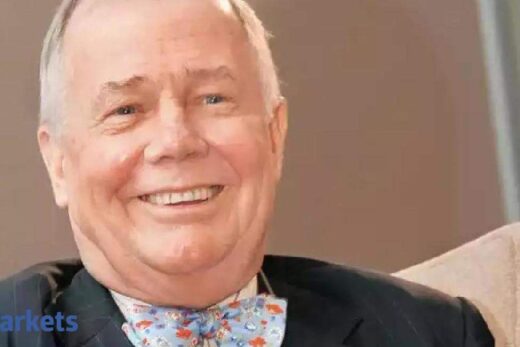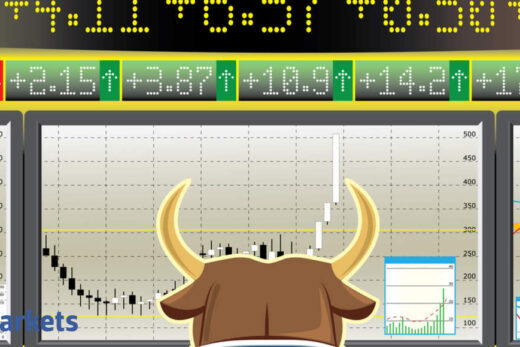A week after short-term yields surged around the world on speculation that central banks would accelerate rate hikes in the face of persistent inflation, the markets abruptly shifted course again after Powell said the Fed would be patient and wait for further recovery in the jobs market. Bonds rallied, driving 10-year yields back below 1.5% and narrowing the gap between long- and short-term rates.
The Fed chair’s stance — along with the Bank of England’s surprise decision to hold interest rates steady — promises to end the price swings that raced through the markets as traders reassessed how quickly banks will start pulling pandemic-era stimulus from their economies. The ICE BofA MOVE Index — which tracks the implied degree of price moves in Treasuries — tumbled this week, pulling back from a 19-month high.
This shift back toward the view that policy makers are in no rush act aggressively will deliver profits to options traders wagering that volatility would ebb. It’s a boon as well for riskier assets like equities that benefit from stability and low rates, with the Fed’s first hike now not fully priced in until late 2022.
Michael Darda, a market strategist at MKM Partners, said that while he does see room for yields to “grind higher” again as the labor market improves, he expects the move to be slow through the end of the year.
“The market should be calmer for the next few months,” Darda said in a phone interview. “Powell went out of his way in saying they don’t think they are close to meeting the criteria for rate hikes.”
 Bloomberg
BloombergA recent stand-out options trade was a $35 million wager against Treasury-market volatility that expires toward the end of next year. Betting with options on smaller yield swings — or selling volatility as traders call it — is also used by bond investors as a way to enhance returns when rates are low.
The bar for big Treasury moves through the rest of the year seems especially high now, given that the Fed on Wednesday laid out its plans to pull back its bond purchases at the anticipated pace through the rest of this year and Powell has made clear he isn’t deviating from his go-slow approach.
By Friday, money-market derivatives signaled the first quarter-point rate increase won’t come until September, with the next in February 2023. About a week earlier, two quarter-point hikes were priced in by the end of 2022, the first of which was expected in July.
 Bloomberg
BloombergA stronger-than-expected monthly jobs report on Friday did little to alter the view of Powell’s message. In fact, bond yields fell across the curve.
“Expectations are that the Fed will be patient,” Jeffrey Rosenberg, senior portfolio manager for systematic fixed income at BlackRock Inc., said on Bloomberg television Friday. “One data point isn’t going to change that. And you are seeing that in the market’s reaction.”
Other measures of expected financial-market volatility have also dropped. The Cboe Volatility Index — a benchmark for U.S. stocks commonly called the VIX — also fell this week. As did the JPMorgan Global FX Volatility Index, a barometer for worldwide currency swings.
A fresh take on U.S. consumer prices on the docket during the holiday-shortened week may further embolden a growing view that inflationary pressures are proving persistent. The bond market will be closed on Thursday for the Veteran’s Day holiday.
Technical forces embedded in supply-demand changes will also play a role in trading. On the demand side, the Fed will announce on Friday at 3 p.m. New York time their new pared down monthly buying amounts as they start their asset-purchase tapering.
On the supply side, after a three-round wave of record doses of quarterly supply, Treasury’s so-called refunding debt auction will be smaller than the last one.
Wednesday’s sale of $25 billion in 30-year bonds, the last of three so-called refunding auctions, is poised to come at yield of below 2%.
What to Watch
The economic calendar:
Nov. 9: NFIB small business optimism; producer price index
Nov. 10: Mortgage applications; jobless claims; consumer price index; Langer Consumer Comfort; wholesale inventories; monthly budget statement; mortgage delinquencies and foreclosures
Nov. 12: JOLTS job openings; University of Michigan sentiment gauges
The Fed calendar:
Nov. 8: Fed Vice Chair Richard Clarida; Powell at Fed diversity conference; Philadelphia Fed’s Patrick Harker; Governor Michelle Bowman; Chicago Fed’s Charles Evans
Nov. 9: St. Louis Fed’s James Bullard; Powell; San Francisco Fed’s Mary Daly; Minneapolis Fed’s Neel Kashkari
Nov. 12: New York Fed’s John Williams
The auction calendar:
Nov. 8: 13-, 26-week bills; 3-year notes
Nov. 9: 10-year notes
Nov. 10: 4-, 8-week bills; 30-year bonds



